Excerpt based on the work of Venerable Master Chin Kung
Translated by Silent Voices
Permission for reprinting is granted for non-profit use.
Printed 2000
PDF file created by Amitabha Buddhist Retreat Centre
http://www.abrc.org.au
It is said, “A tall tree attracts the wind.” When we have some degree of recognition, there can be illegal use of our names to cheat people. There may also be those who gossip about or slander us.
We need to ignore and not respond to any slander and harm done to us because it is improper to respond. Only those who have done something wrong will feel guilty. Responding to such verbal attacks can mean that we feel guilty. As long as I do nothing wrong, I do not care how others slander me for the Buddhas and Bodhisattvas
know the truth. Those who create slander will not be able to escape the law of causality.
Everything, except the law of causality, is impermanent in nature. We often read in the sutras, of Shakyamuni Buddha having said that it is unbelievably rare to be born as a human and to encounter the teachings of the Buddhas. Very strong roots of goodness are needed to accomplish this and therefore, we need to cherish and nurture our roots of goodness.
The Buddha taught us that “Bodhisattvas are constantly mindful of virtues, never allowing the least improper thought to intrude.” This principal is invaluable. For example, I do not pay attention to other people’s business, as it does not concern me. If I am told the good news of others, I will listen and be happy for them. But, if I am told bad things about others, I will stop the speaker immediately and say, “If you want to gossip, tell it to someone else, I don’t want to hear it.” Why do I need to do that? I do it so I can maintain the mind of purity and respect towards all beings and to safe guard these virtues of the true nature from becoming polluted.
When others tell me about someone who is slandering me, I tell them to please stop talking about it. How comfortable our lives will be if we only remember the good that others have done for us! This is to help others cultivate virtues and will result in our having no opponents or enemies. If those who wish us ill exist, the animosity comes from their side because they have misunderstood us. However,
we understand them and regard them with goodwill. Even if they do not realize it in this lifetime, they will in future ones. This is what we learn from the Bodhisattvas.
The ancients said, “The benevolent person has no enemies.” In Buddhism, a benevolent person is a Bodhisattva, a being who has no rivals or enemies in his heart. If we feel that others are not good and that they are finding fault with us, then we have not yet become benevolent. As Buddhists, we need to be diligent in our learning to be able to understand this.
Many non-Buddhists consider birth and death as one of their biggest concerns while Buddhists view cause and effect as the crucial issue. Death is not the end of everything; there are future lifetimes. If in this life, we interact with others and situations with true sincerity and respect, but still encounter unfavorable retributions, then we should feel remorse [for our wrongdoings]. Even if we have not committed wrongdoings in this life, we must have done so in our former ones. It is due to these that we have to undergo unpleasant consequences.
By understanding this, we will accept any adversities that come our way. Our negative karma will be resolved and our karmic debts repaid. In the future, when we again encounter those who viewed us unfavorably, we will be good friends. Retaliation is wrong because this never-ending cycle of vengeance goes back and forth between those involved.
Why do some unprincipled people cheat others? Cheating comes from greed—greed for wealth, fame, and self-benefit. When people inform me of deceptions that were done in my name, I tell them not to look for me, for I can do nothing. Such cases can occur anywhere.
Many Buddhist practitioners write to me of their wish to set up a learning center or Amitabha Village. This is good, but the most important thing for us students of the Buddha is to keep the precepts. If we fail to do so, then Buddhism will disappear. Confucius taught us to abide by accepted codes of behavior. If we fail to do
this, Confucianism will likewise be lost. I have often said that the true underlying meaning of keeping the precepts is to abide by the laws. In the Brahma Net Sutra, the Buddha said, “First, one must not be a traitor to one’s country.” We should
never do anything that will harm society or our country. Society needs to be harmonious with everyone, to accord with one another.
If we have differences with others, we need to reconcile them. We must not disrupt a group’s harmony and cause hostility within it. To do so is to commit the serious offence of gossiping. The retribution for this will be in the Tongue-Pulling Hell [where the offender’s tongue will be pulled out].
Although these people call themselves Buddhists, they neither understand Buddhism nor believe in cause and effect. This is why they dare to commit such offences. Those who truly understand and believe the inescapability of cause and effect will be cautious in their every thought and will refrain from doing anything improper.
We ought to properly use our time to cultivate for bright futures. Learning of the Pure Land method but failing to be born into the Pure Land is tragic! If we were to be born there, then our futures will have surpassed our current lives by at least a million fold. We must take this goal [of being born into the Pure Land] as our sole objective. To accomplish this, we must wholeheartedly follow the teachings of the Buddha.
Why? Because only utmost virtuous people live in the Western Pure Land. In this lifetime, we must cultivate until we too become people of great virtue. Only then we will be qualified to go to the Pure Land. When our thoughts and conduct lack virtue, no matter how well or how much we chant the Buddha’s name, we will not be born into the Pure Land.
In the sutras and commentaries by ancient great masters, we learn that “a pure mind gives rise to a pure land.” The first condition to be born into the Pure Land is that our minds be pure. A pure mind is a completely virtuous mind. When others slander us, we put our palms together and gratefully chant “Amituofo” for they have reduced our karma. In reducing our negative karma, they have created their own and have risked falling into the Three Bad Realms. How can we compound our lack of gratitude by complaining? If we complain about them, we will increase our wrongdoings.
Out of utmost sincerity, we ought to dedicate the merits accumulated in our cultivation to them. Only those who understand the truth can do this. Those who do not realize this will bear anger and hatred for these people. This is wrong, as these thoughts are the causes of the Three Bad Realms.
Compassion is the cause of attaining Buddhahood. To attain true liberation in this lifetime, we have to transform greed, anger, and ignorance into great compassion and true wisdom. We are perfectly confident about this. There is no doubt that our futures will be bright. There are ten Dharma realms, so we have ten paths before us.
Which will we choose? The Buddha told us that the causes of each of the Ten Dharma Realms are within us. Whichever condition we select [by our present conduct], its respective cause will ripen into a result. A wise person possessing roots of goodness and good fortune will choose the path to Buddhahood. Why do we not cultivate
towards this goal. If we do, it is necessary to understand the teachings of the Buddha. Only by realizing the truth within and diligently practicing in accordance with it, can we attain this goal.
In the Sutra of Ten Virtuous Conducts, we are told that everything arises from the mind. Why are we not mindful of virtue instead of wrongdoings? When we give in to greed and pursue worldly fame and wealth, how long can we really enjoy the Five
Desires of wealth, lust, fame, food, and sleep and the Six Dusts of sight, hearing, smell, taste, touch, and thought? Even if we were to live for one hundred years, it is incomparable to infinite time! Such a fleeting period of enjoyment leads to retribution in the Three Bad Realms for infinite eons. How stupid and deluded can
we be! We do not know whether something benefits or harms us.
Why do we not stop our bad deeds such as thinking about the faults of others or hating those who are bad? To transcend the cycle of rebirth and the Ten Dharma Realms, we need to treat every being with true sincerity and equality. Doing so will bring us together with Amitabha Buddha. Why do we not do this? To eliminate
afflictions and bad habits is our crucial mission in this life. Today, it is essential to grasp the principles and practice them with our best efforts so that we will achieve attainment.
In forty-one years of lecturing on Buddhism, I have refined the essence of Mahayana Buddhism into ten attainments. Accomplishing them, we are assured of being born into the Pure Land. True sincerity, purity of mind, equality, proper understanding, and compassion; this is an easier interpretation of the Bodhi mind. We treat all, friend or foe, with true sincerity. Even those who intend to harm or kill us, we treat with an enduring sincere heart. Why? We do this because we are determined to walk the path of Buddhahood. Life is impermanent. If we abandon true sincerity, we will
fall back.
Beings in the Six Realms have a false, corrupted, and discriminatory mind, not a sincere, pure, and equal mind. Our minds are ignorant and selfish, not awakened, kind, and loving. However, if we can transform afflictions into Bodhi, then our true mind of compassion will be uncovered.
How are we to lead our lives? While interacting with others and handling situations, see through and let go. Proper realization of the truth is seeing through. In Buddhism, this is to clearly understand the true nature, form, phenomena, essence, and causality. Imagine how free we will be if we let go of all wandering thoughts,
discriminations, and attachments! We would demand nothing and have no conflicts with others. While others try to win, we would relinquish. While others go forward, we would give way. These are the teachings of all Buddhas and sages that are good for us to follow in our daily lives. In this way, we will lead lives of great ease
and delight. For Buddhists, this is to attain great liberation.
We should accord with proper conditions instead of seeking conditions. In other words, we get along with whatever is proper and do not try to force things to happen. In this way, we will be free from afflictions. When opportunities arise, we work hard to accomplish the task. If no opportunity arises, we will not be affected.
The last time, Mr. Dao, vice president of the Buddhist Association of China, visited us, he discussed the possibility of cosponsoring the Dharma Lecturer Training Class. We felt delighted as we accorded with conditions. If the class does not take place,
we will not be disappointed as we will not be too busy.
If it does take place, we will have the opportunity to repay our gratitude to the Buddha. This is to fulfill our commitment “to repay the Four Kindnesses above and relieve the sufferings of those in the Three Paths below,” [as stated in the Dedication of Merits]. So, we must do all that we can when the opportunity presents itself but not try to force things to happen. In so doing, we will attain freedom and
security in mind and body.
The last of the ten values is to be mindful of Amitabha Buddha and to harbor the unwavering vow to be born into the Western Pure Land. If we cultivate our thoughts and behavior to accord with those of Amitabha Buddha, there is no doubt of being born
into the Pure Land! These ten attainments have been the practice guidelines for my life and for my teaching others. They are the heart of Mahayana Buddhism. We are to endure and achieve what others cannot. We do not strive to benefit ourselves. On the contrary, we do everything we can solely to benefit others.
In our practice, we strive to attain:
True sincerity towards others,
Purity of mind within,
Equality towards everything we see,
Proper understanding of life and the universe,
and
Compassion in helping others in a wise unconditional way.
In attaining these, we will See through to the truth of impermanence,
Let go of all wandering thoughts and attachments,
Attain freedom of mind and spirit,
Accord with proper conditions to get along with the situation, and
Be mindful of Amitabha Buddha,
follow his teachings,
and vow to reach the Western Pure Land.
Friday, May 23, 2008
Subscribe to:
Post Comments (Atom)







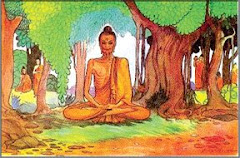





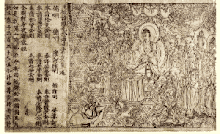


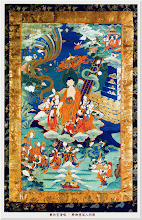

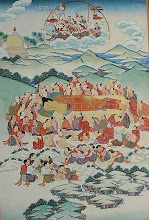


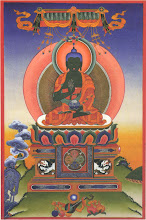




.jpg)

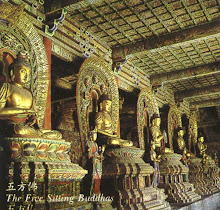

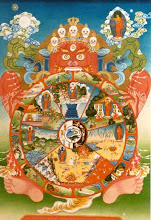


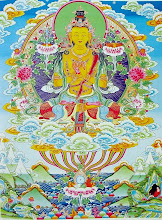








No comments:
Post a Comment